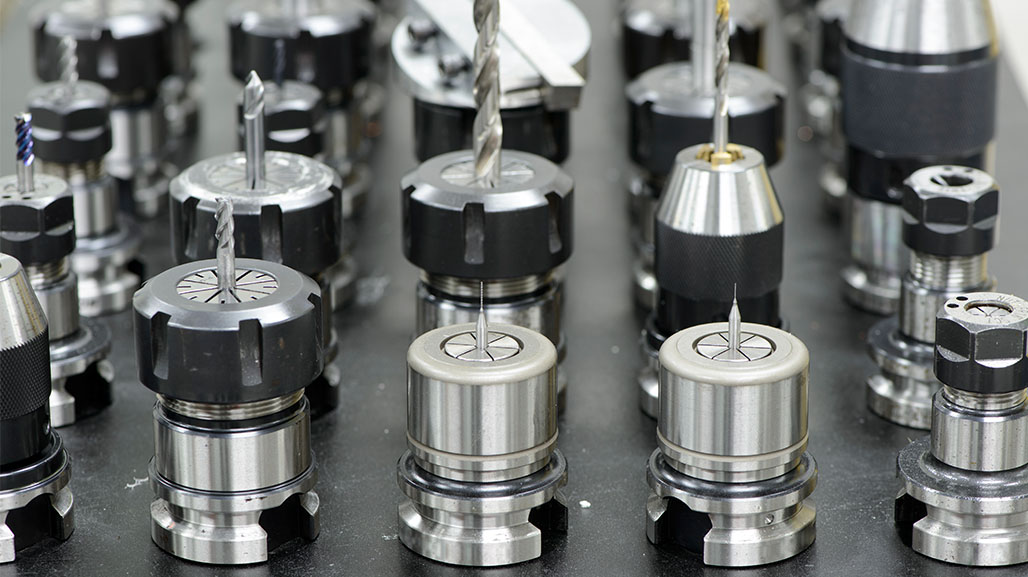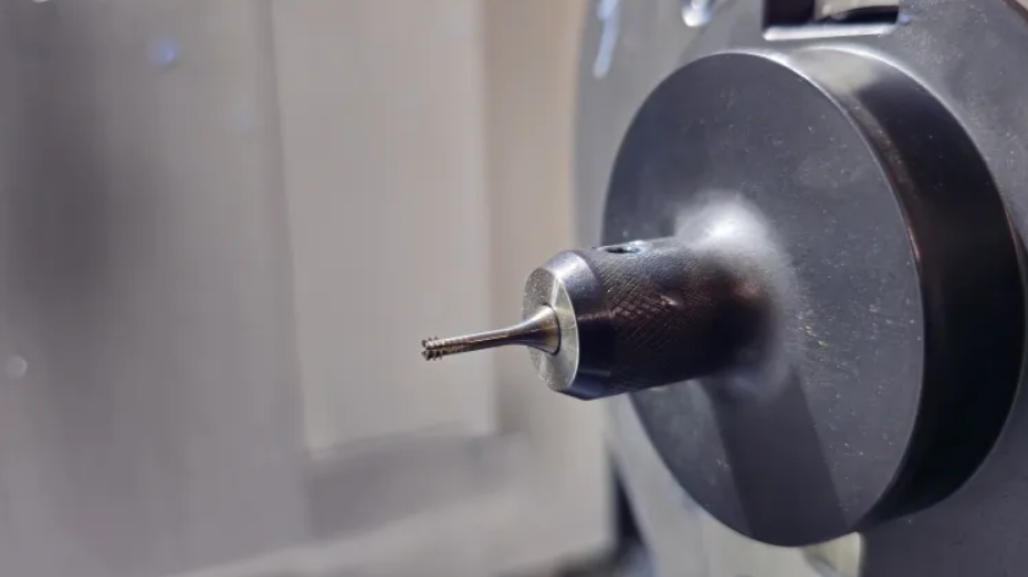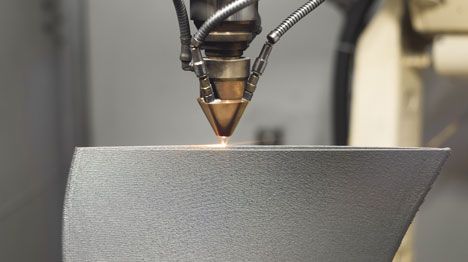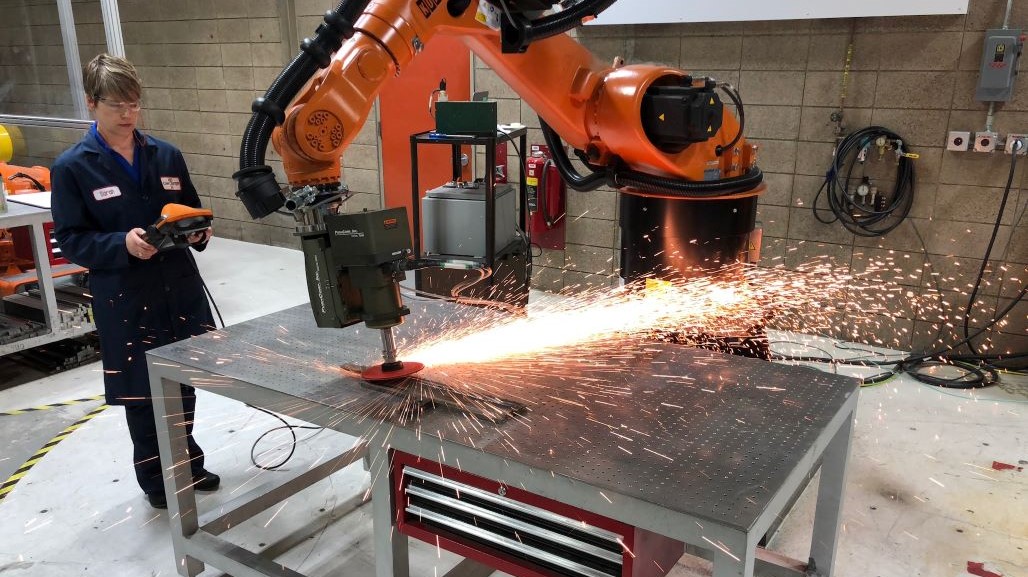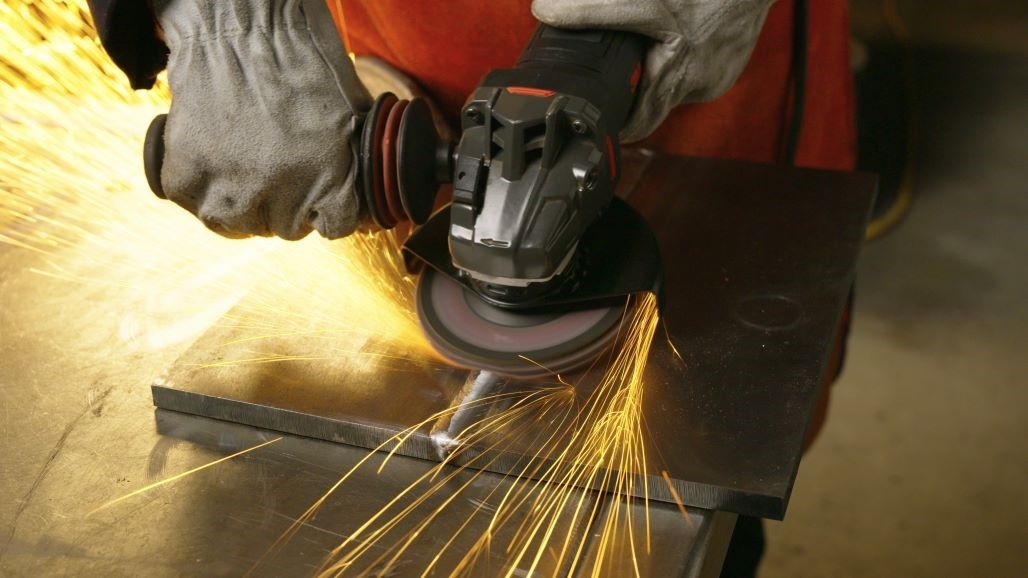Millat Industries: A Powerhouse of Advanced Automotive Manufacturing
Millat Industries is a powerhouse of automotive and aerospace manufacturing. See how they’ve consistently evolved since 1966.
Millat Industries is a powerhouse of automotive and aerospace manufacturing. See how they’ve consistently evolved since 1966.
Three generations of an Ohio family have quietly grown into a high-volume manufacturing business supplying aerospace, automotive parts and commercial parts. Read how Millat Industries builds strong partner relationships and leverages lean manufacturing principles to its success—and its longevity for over 53 years.
Automotive manufacturing in the U.S. is a major force within the U.S. economy: It makes up 3 percent of GDP and is responsible for more American jobs in manufacturing than any other sector.
This vibrant manufacturing segment also accounts for significant export dollars: From 2014 through 2018, the automotive manufacturing industry exported more than $692 billion in parts and vehicles—and eclipsed the aerospace industry by $50 billion, according to the American Automotive Policy Council (AAPC).
“U.S. auto production has more than doubled from 5.6 million vehicles produced in 2009 to 11.3 million vehicles last year [2017],” notes AAPC in its 2018 report “State of the U.S. Automotive Industry.”
To better understand today’s automotive sector, we talked to Dayton, Ohio-based Millat Industries, which has been in business since 1966. Five decades later, Millat Industries now employs 175 associates across its three plants and is led by brothers Zach and Adam Millat—who are the third generation to help run and manage the business. The brothers run Millat’s three manufacturing divisions in automotive, aerospace and commercial parts making and serve 65 customers.
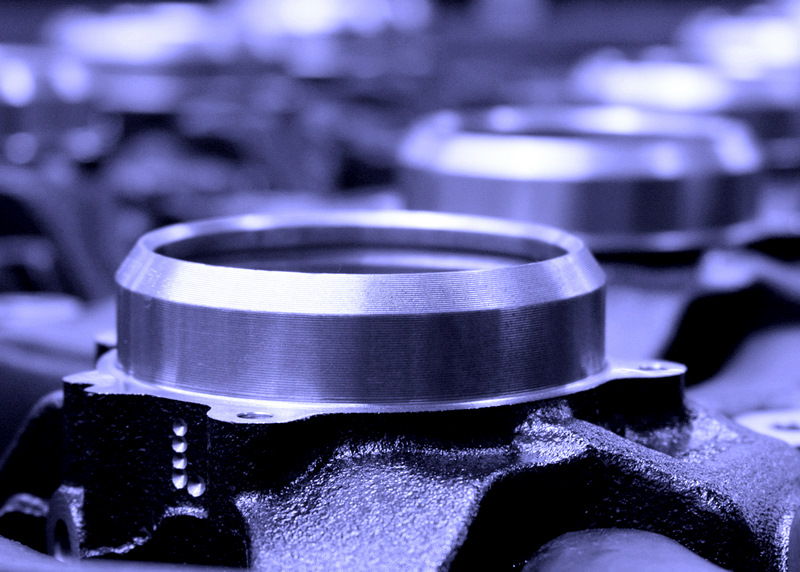
Automotive parts by Millat Industries
On the automotive side, the company is a large-volume precision machining operation making in excess of 40,000 parts a day. It also handles some supplier management and some minor assembly operations, but its core strength is in machining and metalworking.
“Currently, we’re making main engine bearing caps, which is at the heart of the engine and very mission critical for our customers,” says Zach Millat. “We’re also making a variety of engine and suspension brackets that are all machined from iron or aluminum castings.”
Other automotive parts include several covers that go on to engine components that are made out of aluminum die castings and what’s commonly known as steering knuckles machined out of ductile iron castings.

Automotive parts by Millat Industries
Most of these parts range from about half a pound all the way up to 25 pounds—but not 100- or 150-pound pieces. These are parts that can be lifted easily by machinists.
Millat currently has about eight robotic arms currently in use today. It started using one of them back in the late 1990s after the movie Jurassic Park came out. In fact, the company bought one of the Mitsubishi robotic arms that was used to move incubated dinosaur eggs around in the film.
Named “Hollywood,” the arm was in production for about 15 years doing material handling and inspection. It tended a parts washer and performed camera operations on aluminum die casting parts for an automotive air conditioning compressor.
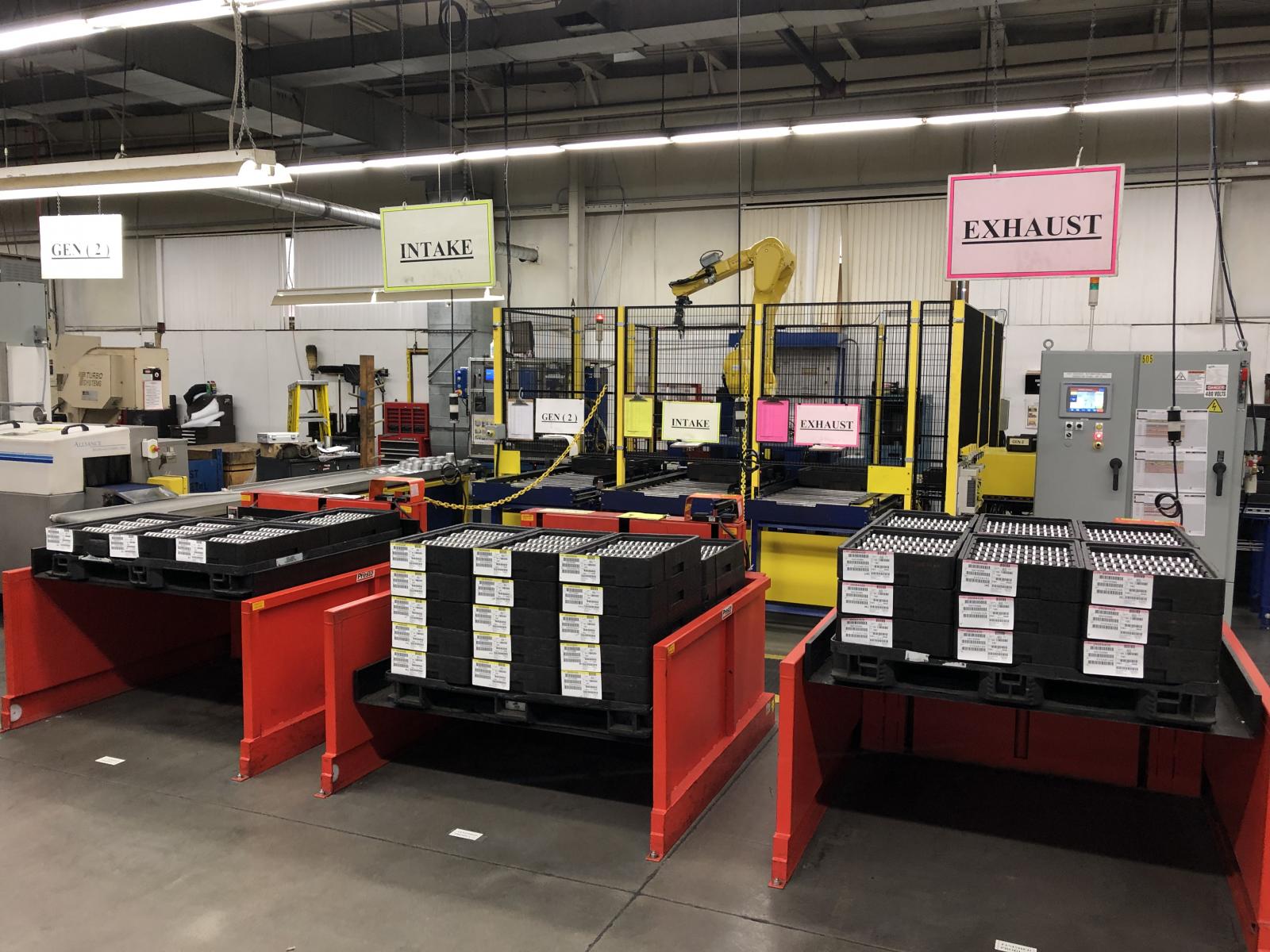
Shop floor with robotic arm at Millat Industries
Hollywood came on the scene before Zach and Adam were running the operation, but they believe the company has really upped the ante on automated production in the time since. Though it’s not without its own set of hurdles to jump.
“It’s fair to say we’ve really upscaled the sophistication of the automation cells we’ve installed within the last five years,” Zach says. “They’re making them more robust. But it can be a little bit of a challenge to integrate today’s robotics with the rest of your systems. Also, there’s work to get everything programmed to your needs.”
That’s not to say the company isn’t up to the challenge—nor are its employees wary of being replaced by machines.
“We’ve always found that our associates and people really want to learn about those kind of systems and to be involved in learning how to work with them, so there’s really not the stigma of them taking anyone’s job here,” he says.
The general challenges are around dealing with all the logic needed for a robot, to understand how to leverage the different prototyping and production scenarios that you have to consider before implementing these systems.
At this point, a robotic arm is a commodity, say the Millat brothers, but there is a lot of testing needed to use them. It’s a more complex custom designed system than a CNC machine. It has a variety of electrical controls and mechanical elements that are very different.
“One of the toughest aspects of the automotive side are defects,” says Adam Millat. “Maybe the defects are only 1 out of 20,000 that a robot drops a part, but at the volumes we do, that might be once every day still. So we’re really focused on driving defects out of our operation.”
Learn how adding automation to industrial production tasks can escalate your competitive edge. Read “Getting Robot-Ready in Metalworking with Cobots.”
In the automotive world, the stakes are high. It’s a very competitive space. An OEM can initiate a “sort” or inspection at the expense of the manufacturer without the manufacturer’s approval. This means time and money away from making parts, so it takes defects and scrap very seriously.
“We dread customer defects,” says Zach Millat. “Customer defects are addressed safely within the hour we receive notice of an issue. We’re invested in corrective action and containing any possible defects.”
Millat says it’s a similar process for internal scrap issues, where they “will go through a corrective action process to identify the root cause and design a new method or process or a ‘poka yoke’ to prevent it from happening in the future.
What’s poka yoke? It’s a lean manufacturing approach intended to error-proof mistakes. It was originally designed by Shigeo Shingo in the 1960s and implemented at Toyota.
“Continuous improvement is embedded in our culture and in our mission statement. That doesn’t mean we don’t make mistakes, it just means that when we’ve made them in the last 53 years, we aim to make them only once,” says Zach Millat. “Our attitude is that everybody makes mistakes. How you set your self apart is how you adjust to those mistakes, how you rectify the mistakes that are made and how you keep your customers happy.”
Continuous improvement also extends to how Millat leverages its partnerships with integrators, such as those with robotics expertise and its swath of raw materials, machine and tooling suppliers.
As a large volume manufacturer making hundreds of thousands of parts a week, Millat Industries has many suppliers that it leverages to help cut its costs and refine efficiencies across its supply and production delivery chain.
Simply put, Millat’s volume levels mean it goes through a lot of tools in the course of a week, month and year. Even when using the best technology out there for its tooling—the company’s volume mandates changeovers and new tools daily.
MSC is not Millat’s only tooling supplier on its roster, but it has developed a very strong and mutually beneficial working relationship. Millat takes advantage of MSC’s vending product
with a very unique, customized approach. Millat has seven vending towers across two of its plants. With MSC’s assistance, Millat has also made its tool cribs into vending-like storage units leveraging key card and code inputs to access and replenish tooling inventory.
“It has really enabled us to get inventory under control and know what we have and keep the lowest inventory on hand to keep things running,” says Pat Noll, corporate purchasing manager at Millat Industries. “Ninety-five percent of the tooling that we receive through the vending system with MSC we get next-day, which enables us to keep our minimum-maximum levels reduced.”
Looking for new ways to find savings in your manufacturing operation? Read “Better Supply Chain Management: Take Control Of MRO Spending.”
Noll says they are receiving deliveries every day, but they’ve gotten to the point where vending machines don’t need to order every day. Because of vending, they have been able to optimize ordering every two or three days—which keeps costs predictable without sacrificing operations and production levels.
“Over the years, we’ve really got it dialed in and it works well for us,” says Noll. “We have one person running our tool crib who handles all the spending system and for as many tools as we have in inventory … she would not be able to do it without that business system.”
“It’s an integral part of what we do here,” says Adam Millat. “Vending and our tool crib system allows the supplies to be closer to the point of use, which results in less ‘Muda’—which is the Japanese term for waste.”
“It also allows us to assign what tools can be used in what areas and who can sign them out,” says Zach Millat. The company also performed a custom integration from the MSC vending system into its ERP system working with a third-party systems integrator.
“So when a job or when a tool is logged out of the machine, it’s actually charged directly to a job in our costing system,” says Zach Millat. “And it will automatically reorder and place a purchase order directly through our ERP system.”
Another key aspect of the relationship is MSC’s agnostic approach to tooling and supplies—and an understanding of when the right tool or service level might be with a different tooling company. MSC metalworking specialist Darin Bolden and sales representative Bill Stover have been an integral conduit of support and service to Millat’s success with vending, tooling and process efficiency, says Noll.
“There are situations where we demo tools, and if we end up using it, we pay for it,” says Noll. “But if it does not work out, it’s no skin off our back. Our reps are in here sometimes twice a week or every other week on Fridays and we work very closely together.”
The company’s origins date back to its first generation as a tiny tool and die operation in a two-car garage of Bob Millat, the grandfather of Zach and Adam Millat. With only a couple of hanging lightbulbs, no plumbing or running water, the small shop made custom tooling for local, larger manufacturers.
“He tells us he had a 5-gallon bucket in the corner of the garage to use for his ‘facilities,’” says Zach Millat, vice president of operations.
From there, the Millat brothers’ father, Greg Millat, who is the company’s president, helped grow the business over the years by serving the automotive industry with tooling and fixturing—and forging strong industry relationships with some of the most well-known American and Japanese automakers in the market.
In the late 1980s, several of the automakers needed parts as their internal processes couldn’t supply the parts at the volumes they needed. Millat was approached, and the rest is history.
“From there, I think we earned our stripes on quality and delivery and were able to quote new products that were coming out and became an automotive supplier,” he says. And as those higher volumes became the norm, the company’s investment in the machining technologies of the day helped them continue to expand into aerospace and commercial construction parts.
That same investment in machining technologies lives on today.
“It’s transitioned to become a world-class, automated machining cell-based manufacturer with equipment sourced from around the world,” says Adam Millat, who is also a vice president of operations in the aerospace division.
